|
Limitar tu búsqueda
[+–] Editorial
[+–] Fecha
[+–] Formato
[+–] Idioma
[+–] Tipo de documento
[+–] Tipo de recurso
[+–] Classification
- Revistas -- Well-being and Social Policy [X]
- Vol. 1, Num. 1, Second semester 2005 (6)
- Vol. 2, Num. 1, First semester 2006 (8)
- Vol. 2, Num. 2, Second semester 2006 (7)
- Vol. 3, Num. 1, First semester 2007 (8)
- Vol. 3, Num. 2, Second semester 2007 (6)
- Vol. 4, Num. 1, First semester 2008 (5)
- Vol. 4, Num. 2, Second semester 2008 (6)
- Vol. 5, Num. 1, First semester 2009 (6)
- Vol. 5, Num. 2, Second semester 2009 (5)
- Vol. 6, Num. 1, First semester 2010 (6)
- Vol. 6, Num. 2, Second semester 2010 (6)
- Vol. 7, Num. 1, First semester 2011 (4)
- Vol. 7, Num. 2, Second semester 2011 (3)
- Vol. 8, Num. 1, First semester 2012 (3)
- Vol. 8, Num. 2, Second semester 2012 (4)
- Vol. 9, Num. 1, First semester 2014 (8)
|

|
|
Social security pensions and retirement decisions in Mexico
Using Mexican cohort data for 1991-2000 this article examines the relationship between retirement decisions —the transition from work to labor market inactivity— and social security (contributive) pensions in less developed countries. The available large time series also makes possible to examine how a financial crisis that took place in 1995 has affected retirement incentives. In most Latin...
|
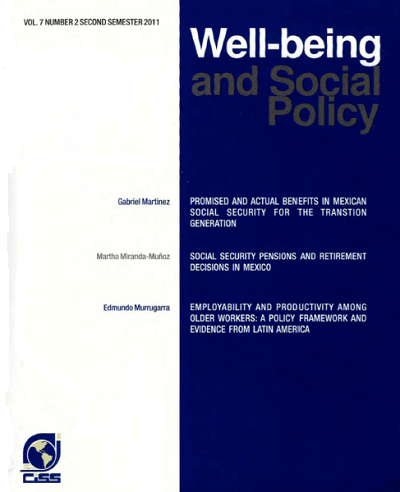
|
|
|
|

|
|
Promised and actual benefits in mexican social security fot rhe transtion generation
Este artículo presenta un conjunto de mediciones de los costos y beneficios reales del plan general de retiro por jubilación proporcionado a los ciudadanos por parte del Sistema Mexicano de Pensiones (SMP), que son necesarias para evaluar las decisiones de los trabajadores en cuanto a la contribución a la seguridad social (es decir, trabajar en el sector formal) y al retiro. El SMP ofrece dos...
|
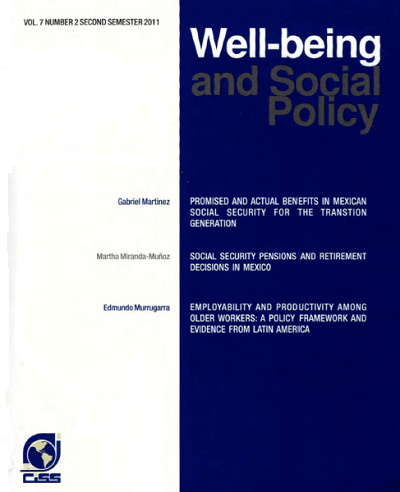
|
|
|
|

|
|
Review of the 2010 World Health Report. Health system financing
The document that was presented by the World Health Organization (WHO) in February 2011 sets forth a series of proposals to encourage member countries to achieve universal health coverage. These proposals are presented in detail and are based both on world statistics and case
studies.
|
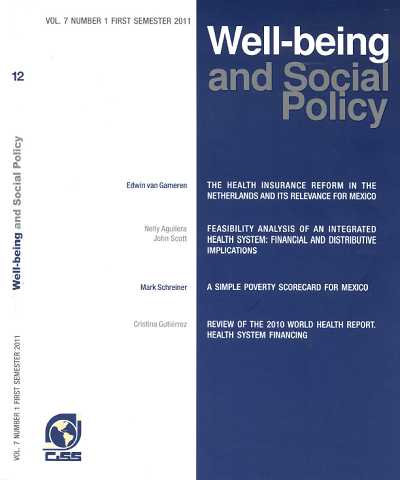
|
|
|
|

|
|
A simple poverty scorecard for Mexico
This study uses Mexico's 2008 National Household Survey of Income and Expenditure to I construct an easy-to-use scorecard that estimates the likelihood that a household has income below a given poverty line. The scorecard uses ten simple indicators that field workers can quickly collect and verify. Poverty scores can be computed on paper in the field in about five to ten minutes. The scorecard's...
|
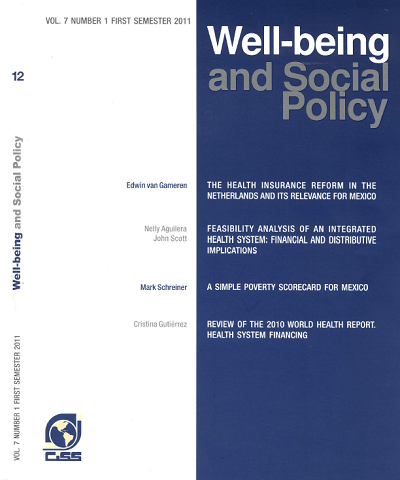
|
|
|
|

|
|
Are loan guarantees effective? The case of mexican government banks
Mexican Government’s Banks offer loan guarantees to private banks in order to spur credit directed to non-financial small and medium sized firms and this policy is examined here. Application of representative data to the comparative static analysis of the guarantee-use decision suggests that these schemes, as currently designed, are justifiable from an economic viewpoint. However, there is some...
|
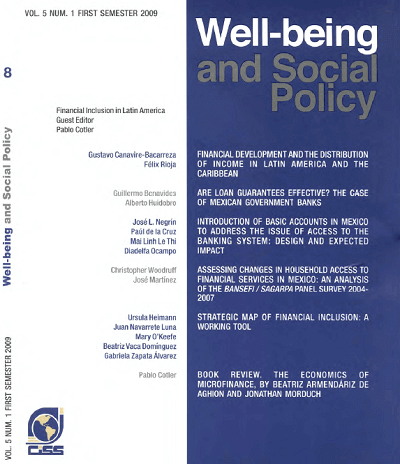
|
|
|
|

|
|
Book review. Beyond survival. Protecting households from health shocks in Latina America, by Baeza, Cristian C., y Truman G. Packard
The book by Cristian Baeza and Truman Packard is based on the next hypothesis: adverse health events reduce the consumption of goods and services different from health services, and many households become poor because of that. While the authors recognize that the evidence they present on the topic is limited, they propose the use of a “universal risk pool” as a way to eliminate the problem of...
|
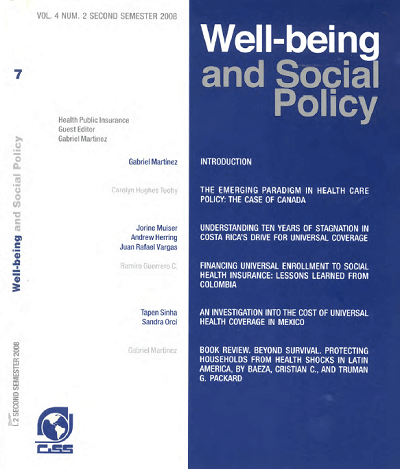
|
|
|
|

|
|
Restrictions, problems and dilemmas of social provision in Latin America: facing challenges from aging and income inequality
This paper discusses the main restrictions, problems and dilemmas that social provision faces in Latin America in a context of demographic changes and low achievements in the economic performance, particularly in the labor market. It is proposed the need to adapt the general social provision matrix as function of priorities and restrictions set by financing access. Due to the limited labor...
|
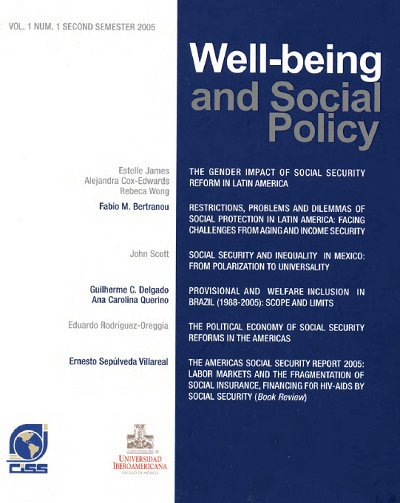
|
|
|
|

|
|
Unemployment insurance in Chile: a new model of income support for unemployed workers
This paper describes the Chilean experience concerning the implementation of a new unemployment insurance (UI) program. The use of individual savings accounts and private management are essential elements. In addition, a redistributive fund (Common Fund) helps workers pool risks, distributing resources from employed to unemployed workers and from stable firms to workers with low incomes and...
|
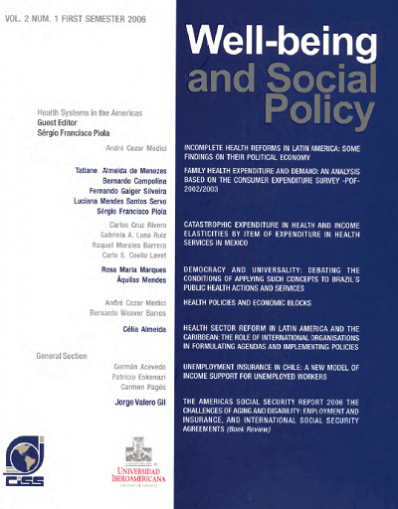
|
|
|
|

|
|
Review of International migration, remitances, and the brain drain, edited by Çaglar Özden y Maurice Schiff
As the volume title suggests, three of the studies deal with the effects of remittances on incomes and measures of well-being, four address various aspects of highly skilled migration, while the remaining paper examines the determinants of migration from rural Mexico to the US. Each of these is certainly topical: the rise in reported global remittance flows has been a major spur to the recent...
|
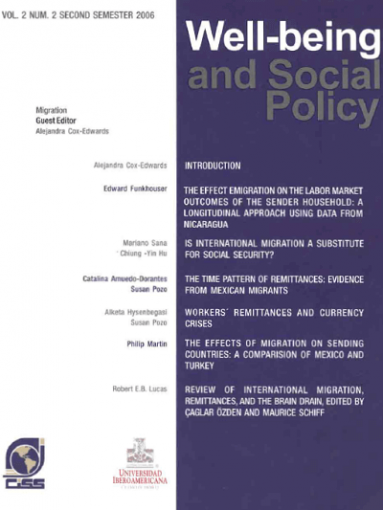
|
|
|
|

|
|
The effects of migration on sending countries: a comparison of Mexico and Turkey
International migrants are persons who cross national borders and remain outside their countries of birth or citizenship for 12 months or more, regardless of the reason for being abroad or legal status while abroad. According to UN estimates, the number of international migrants was 191 million in 2005, and half were in the labor force of the destination country. International labor migration...
|
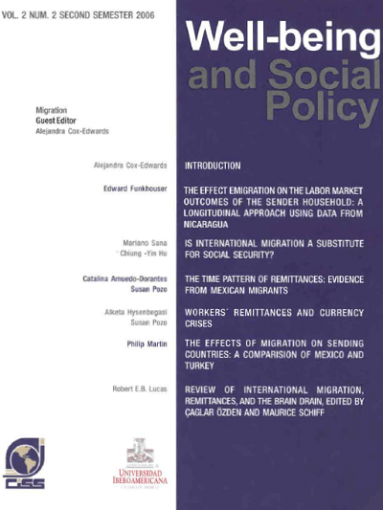
|
|
|
|

|
|
Workers' remittances and currency crises
We seek to further understand the factors that determine per emigrant remittances using data from 23 Latin American and Caribbean countries over the 1980-2003 period. We find that emigrants avoid remitting when the exchange rate is under pressure. This finding is consistent with the notion that remitters strive to reduce their exposure to exchange rate losses by taking into account the expected...
|
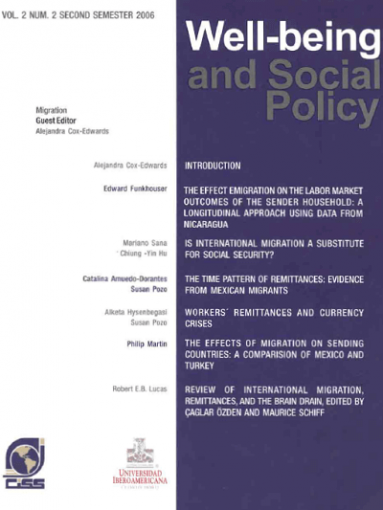
|
|
|
|

|
|
The time pattern of remittances: evidence from mexican migrants
We explore the time pattern of remittances using data on return migrants from the Mexican Migration Project. Some of these return migrants have settled in the U.S. and are returning to Mexico to visit family and friends, whereas others are temporary migrants returning home after a working spell in the U.S. We find that the dollar amount remitted first increases with time spent in the U.S. to...
|
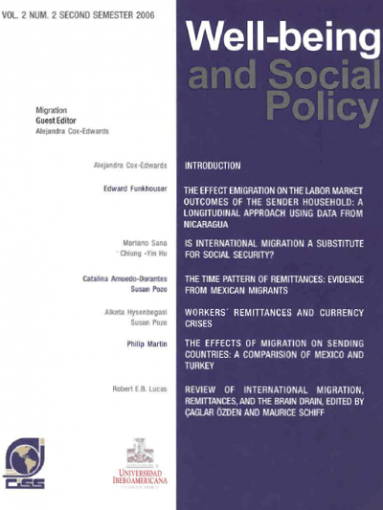
|
|
|
|

|
|
Is international migration a substitute for social security
The focus on short-term macroeconomic factors, including unemployment and wages, is insufficient to explain international migration. Institutional factors, bound to change only in the long run, can potentially have a large impact on migration flows. To illustrate this, we analyze Mexico-U.S. migration focusing on social security coverage, an important indicator of job formality. Using...
|
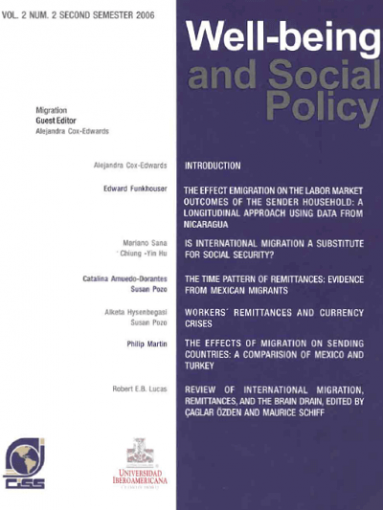
|
|
|
|

|
|
The effect of migration on the labor market outcomes of the sender household: a longitudinal approach using data from Nicaragua
In this paper, I use longitudinal data from the 1998 and 2001 Living Standard Measurement Surveys in Nicaragua to examine the impact of the emigration of household members on the household labor market integration and poverty. The main findings of the paper are that households from which an emigrant left had a reduction in members, a reduction in working members, a reduction in labor income than...
|
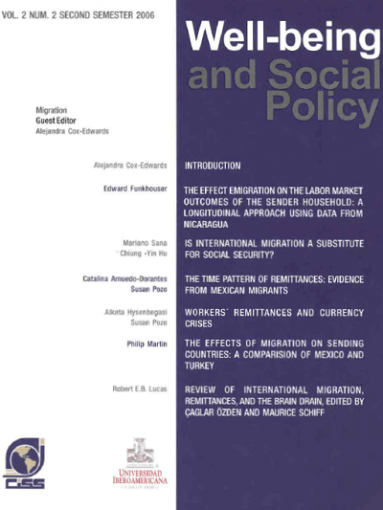
|
|
|
|

|
|
Introduction (about an international conference on "The effects of migration on sending countries")
The Inter-American Conference on Social Security (CISS) and Universidad Iberoamericana (UIA) co-hosted an international conference on “The Effects of Migration on Sending Countries” in February of 2006. The major objective of the conference was to examine a variety of channels through which migration affects the sending countries. Migrants change the dynamic of sending households; alter labor...
|
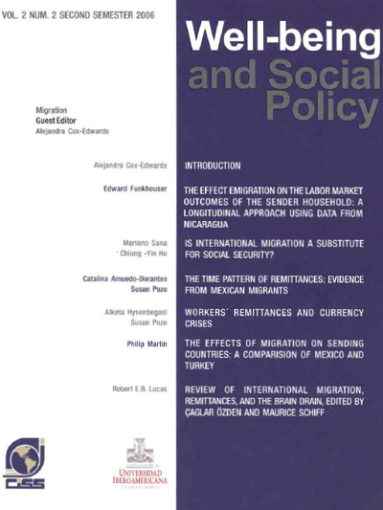
|
|
|
|

|
|
The Americas Social Security Report 2006 The challenges of aging and disability: employment and insurance, and international social security agreements (book review)
The 2006 Issue of the Report on Social Security in the Americas is divided in four chapters. The first two chapters address older-adult issues, the third chapter deals with disability-related problems, and the fourth chapter discusses Social Security agreements in the Americas. In the Presentation, it was pointed out that the objective of the Report on Social Security in the Americas is to become...
|
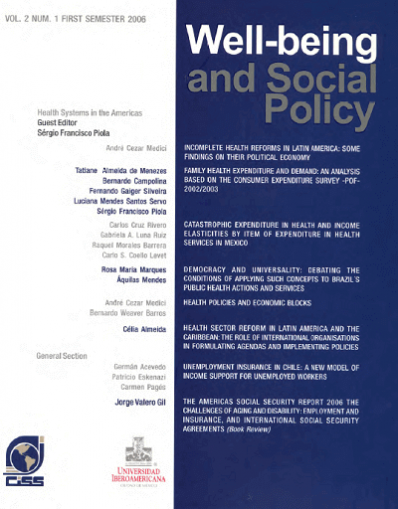
|
|
|
|

|
|
Health sector reform in Latin America and the Caribbean: the role of international organisations in formulating agendas and implementing policies
This article examines health sector reforms in Latin America and the Caribbean to discuss the ideological, theoretical, and conceptual elements that inform the reform agenda and the models put forward for attaining greater equity in the region’s countries. Its starting assumption is that the relevant literature generally neglects the economic, social, and political aspects underlying the...
|
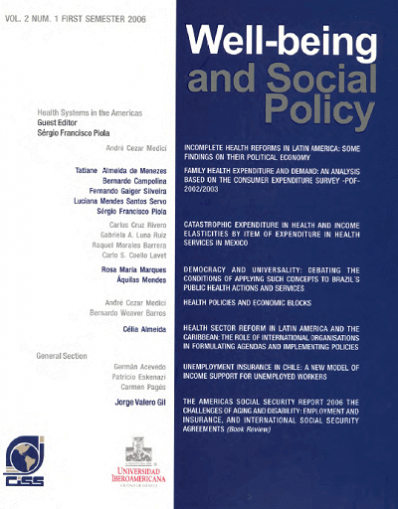
|
|
|
|

|
|
Inequality, quality of primary education and development in Latina America and the Caribbean
This paper draws on a political economy model to hypothesize that the quality of education is likely to be lowered by both economic and political inequalities. In particular, we utilize a panel data set across countries and over time to test the applicability of the hypothesis to quality of education indicators at the primary level. Among the four specific indicators of primary education assigned...
|
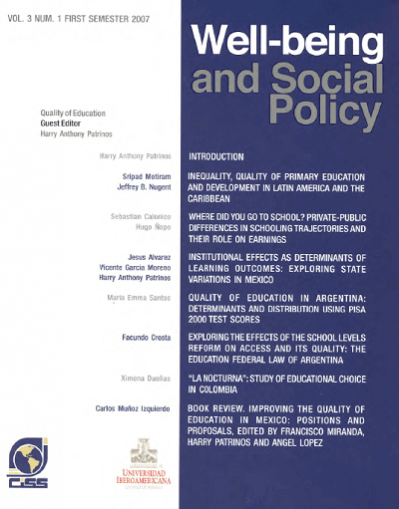
|
|
|
|

|
|
Health policies and economic blocks
This paper analyzes the roles of health goods and services markets within the regional integration process. It is a known fact that the consolidation of integrated markets is slower regarding social goods and services (as health and education) than among other goods and services (e.g. durable consumption goods). The paper discusses the nature of the health sector and its global dimension, showing...
|
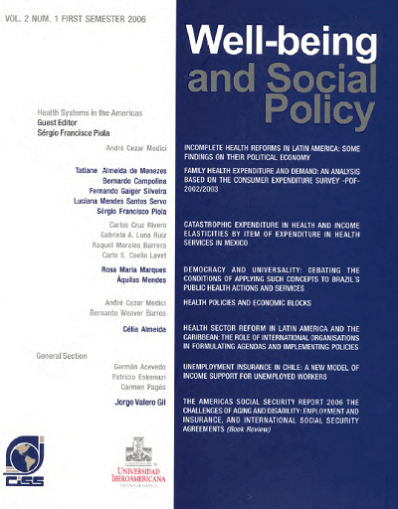
|
|
|
|

|
|
Democracy and universality: debating the conditions of applying such concepts to Brazil's public health actions and services
This paper reviews the determinants and conditionalities of the process of universalizing public health in developed countries, notably the European ones, and in Brazil, and is aimed at highlighting their differences. The first part discloses the main interpretations on the constructing of the Welfare State, emphasizing the characteristics of that historical moment and its articulation with...
|
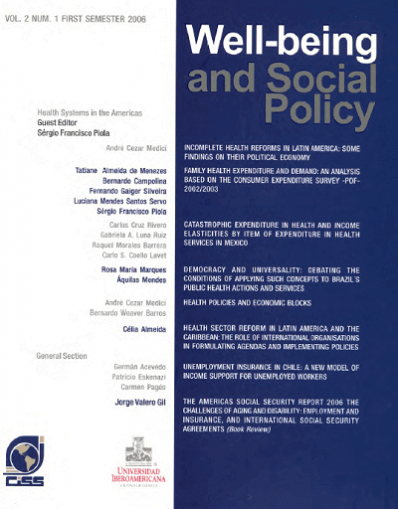
|
|
|
|
|